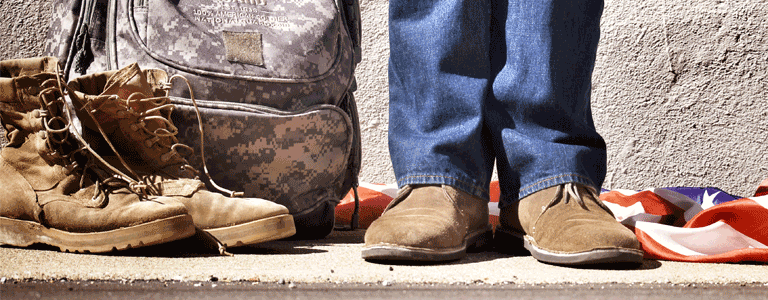EXCLUSIVE BRITISH MILITARY DISCOUNTS

Each year, thousands of men and women leave the armed forces due to a variety of reasons. Some have served for decades while others have not even completed their basic training. Regardless, leaving the military can be a stressful time.
Most service leavers do well with the transition, and they’re able to gain and hold down jobs.
However, a percentage of service leavers will struggle with the transition. Some of the most common challenges amongst these veterans are;
- Low income
- Severe injuries and disabilities
- Mental health disorders such as depression and PTSD.
Fortunately, there are countless services and organisations that support service leavers and their families, and make the transition less stressful.
What Happens When You Leave The Armed Forces?
There are a lot of changes that come with leaving the armed forces. First, if you’re living in MOD accommodation you’ll need to make arrangements and move to civilian housing. If you have nowhere else to live after discharge, the MOD has an obligation to refer you to a local authority of your choice.
Leaving the armed forces often means that you’ll need to find employment. On discharge, you’ll be given a Service Leavers Pack which consists of your certificate of service, veteran badge, and veteran card. Your certificate of service is a key document when you’re seeking employment.
You’ll also need to return your service clothing and equipment before you take your terminal leave.
What Can You Expect?
As you prepare to leave the armed forces, you’ll need to look into a civilian job, housing, educational support, life insurance, pay, pension and other benefits. This can be undoubtedly overwhelming. So, what can you expect? What are you entitled to in regards to these aspects?
Housing.
It’s up to you to find a viable housing option one you leave the forces. For some service leavers, this may be moving back in with your family. If this is not a viable option for you, you’ll need to explore other alternatives. You can contact the Service Resettlement Adviser (SRA) for guidance and support .
Employment.
The civilian job market can be confusing and hard to navigate. To secure a job, you may need a degree, certifications, or training. You should start planning for your career after the military long before you leave the forces.
The Career Transition Partnership (CTP) offers invaluable support to service leavers in preparation for civilian employment. The amount of support offered by CTP varies from one individual to another depending on the length of service and the reasons for discharge.
- If you have served for less than 4 years, you’ll receive support from the CTP Future Horizons team. This support will last for up to two years post-discharge.
- If your term of service was between 4 and 6 years long, you’re eligible for support from the Employment Support Programme (ESP). You can access ESP up to one year before you leave the forces and two years post-discharge.
- If your term of service exceeds 6 years or if you’re medically discharged, you’re eligible for support from the Core Resettlement Programme (CRP). CRP will offer their support for two years before you leave the forces and up to two years after you’re discharged.
Educational Support.
As a service leaver you may be keen on furthering your education. The Armed Forces Learning Scheme supports service personnel and veterans who wish to study.
If you’re looking to pursue higher education you can seek assistance from Enhanced Learning Credits (ELC). Standard Learning Credits (SLC) provide financial assistance for small-scale studying.
Pay, Pension and Benefits.
You can expect to receive payment up to and including the date of discharge. You may also receive a pension or other benefits depending on your age at discharge and the length of your service.
Useful Services that Can Help With Transitioning.
Joint Service Housing Advice Office (JSHAO).
JSHAO provides useful information and guidance for service personnel and service leavers who are transitioning from MOD accommodation to civilian housing.
JSHAO is also in charge of the MOD referral scheme. They work alongside the local authorities to provide social housing for service leavers.
RightJob.
This is the CTPs jobs board which connects service leavers with employers who are seeking ex-military personnel. There are many employers who use the CTP jobs board including AA, Tesco, Amazon, BAE Systems, Boeing, Mastercard, Barclays, Metropolitan Police Service, Jaguar, Land Rover, and Fujitsu.
NHS.
Once you leave the forces, it’s important that you and your family register with an NHS GP. Ensure that you notify them that you’re a veteran as this will grant you access to veterans’ priority health services.
Single Person Accommodation Centre for the Ex-Services (SPACES)
You can contact SPACES for help in finding housing if you’re a single service personnel who is about to leave the military.
SSAFA.
SSAFA provides welfare and health support to members of the armed forces, veterans, and their families.
Haig Housing.
This is a charitable housing trust that allows service leavers and their families to rent homes at an affordable cost.
Sources:
- https://www.army.mod.uk/people/leave-well/service-leavers-veterans/transition-to-civilian-life/
- https://www.ssafa.org.uk/about-us/how-we-help
- https://assets.publishing.service.gov.uk/government/uploads/system/uploads/attachment_data/file/928535/SLG_Oct_Edition_FINAL.pdf


